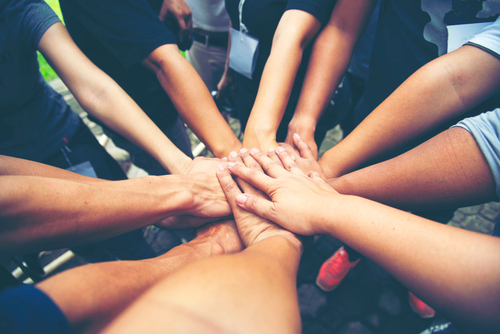All traumatic events, both individual and collective, are frightening experiences that cause great distress to those who go through them. They usually involve life-threatening situations, illness, death, abuse, or injury. While all these things can happen on an individual level to a single person, they can also happen to a large number of people at the same time. However, collective trauma is most commonly experienced by smaller groups of people, mostly families, friend groups, or colleagues.
The type of emotions collective traumas can cause and the long-term scars they leave are similar to those inflicted by individual trauma, but there are also specific characteristics of collective trauma. These specifics can be perceived in the way severe trauma is experienced, as well as the ways people overcome it, both as a community and as individuals.
What Is Collective Trauma?
Collective trauma is the result of a large-scale traumatic event that affects entire groups of people. This can happen in a situation like natural catastrophes, earthquakes, floods, wars, disease outbreaks, pandemics, terrorist attacks, mass and school shootings, hostage situations, recessions, and so on. However, collective traumas can also happen after traumatic events within a family or a group of friends, usually after a death or a severe accident of a loved one.
There have also been numerous collective trauma experienced throughout history that can transfer onto the next generation, deeply shaping entire communities. Some of the most powerful examples are events like slavery, the holocaust, famine, and multiple occurrences of genocide and religious persecution.
However, not all people inside the affected group get equally traumatized. This can depend both on the objective circumstances of what they went through, as well as their individual capacity to cope with traumatic events. While some members of the collective directly experience sickness, death, injury, or loss of a loved one, or their whole family, others feel the repercussions in diverse ways – indirectly. Some of the indirect ways to experience collective trauma could be job loss, financial difficulties, or temporary separation from family members and friends.
What Are The Signs And Symptoms Of Collective Trauma?
Communities and groups of people can be affected by shared traumatic experiences in several different ways. Emotional and psychological symptoms of collective trauma are not that different from the ones caused by individual severe trauma, and they commonly include:
- Fear
- Grief
- Anxiety
- Depression
However, there’s another important aspect of collective traumas. Events that cause it can permanently change the way a certain community or a group of people sees itself. Just like individual trauma can influence one’s self-image, collective trauma can transfer through generations of collective memory and affect the way future generations view themselves too.
It goes as far as causing greater collective and individual fear. It can change the functioning and the dynamic of the group itself, relationships between people inside the group, but also with other groups as well. Both the traumatized generation and the future generations can adopt higher alertness for any potential dangers or threats, and heightened feelings of vulnerability. Collective trauma can even influence the general feeling of national or ethnic pride.
Symptoms that point to collective traumatization are:
- Panic
- Hopelessness
- Helplessness
- Disorientation
- Stress
- Existential crisis
- Collective PTSD (post-traumatic disorder)

How Does Collective Trauma Affect Our Mental Health?
The effects of collective trauma on mental and physiological health are two-sided. This is where group trauma can get quite individual and personal. Since some people are better equipped to deal with the impact of events that transpired, the intensity of trauma-related feelings won’t be the same for everybody involved. Some will handle difficult situations better than others and are better equipped to deal with the consequences.
This generally depends on individual personalities, coping mechanisms, emotional health and well-being, as well as personal resilience. However, and this is a particularly important aspect, the way people deal with collective trauma will also depend on their socioeconomic background and other factors that determine their position in society.
Experts agree that collective trauma is harmful to the mental health of everyone experiencing it, and some factors that contribute to that are:
- The general feeling of despair and hopelessness.
- Arguments and conflicting opinions inside the group about the best way to deal with the event in question.
- Oversaturation with disturbing images repeatedly shown in the news and other media.
Adolescents and children experience psychological and emotional repercussions of collective trauma more severely than adults. This is mostly due to the fact that they still haven’t had a chance to develop healthy coping mechanisms. Since these age groups are more vulnerable to trauma in general because their brain is still developing, they’re more susceptible to the influence of stress hormones. Unhealthy coping mechanisms might turn to risky or self-destructive behaviors like drinking, substance use, or eating disorders.
How Do I Cope With Collective Trauma?
Coping with collective trauma has two sides – how you cope as an individual and how you cope as part of the group that experienced the traumatic event. People who look at the event as a way to band together and work toward the common good usually heal faster from the traumatic experience. Some may even feel like they came out of it stronger.
Some of the positive aspects of shared trauma are the newfound solidarities caused by a shared experience of pain and distress. And it’s also known that severe hardships bring people together, making them form closer relationships while working on achieving a common goal.
Some of the ways that could heal ease the burden of collective trauma-related emotions include:
- Talking to people who can relate to your experience and feelings, finding support networks.
- Participating in group efforts strengthens community relationships.
- Expressing shared values but also sharing feelings of sadness, anxiety, and fear.
- Turning to all usual life routines after the danger has passed.
- Engaging in physical activity and exercise can help clear your mind of intrusive thoughts and help balance your nervous system, as trauma affects your mind, body, and your physical response to stressful emotions.
- Spending time in nature.
- Eating healthy food.
- Expressing your emotions in honest conversations with friends and family or getting professional help if necessary.
- Maintaining close relationships with family and friends.
- Being truthful about your thoughts and emotions with your partner.

Recover from collective traumatic events and find new strength to return to your life in a healthy way
If your emotional health has been affected by severe collective trauma, that may have affected the way you observe the world, other people, and yourself in it, causing you to experience difficulty building or maintaining healthy relationships with new people as well as those who’ve been in your life for quite some time now. Relationships with your partner, friends, and family could all suffer the consequences of collective trauma even if you experienced it together.
To begin healing as a collective, you also need to heal as an individual. Trauma treatment and recovery may be a long and arduous process for some, but with the support and guidance of our PIVOT coaches, you gradually learn to adapt to your new self, inevitably changed by the severe trauma you experienced. PIVOT’s small group workshops are a perfect solution for dealing with collective drama. You can feel the support of people who know what you’re going through, and with professional guidance from our experienced coaches come out of it more resilient.